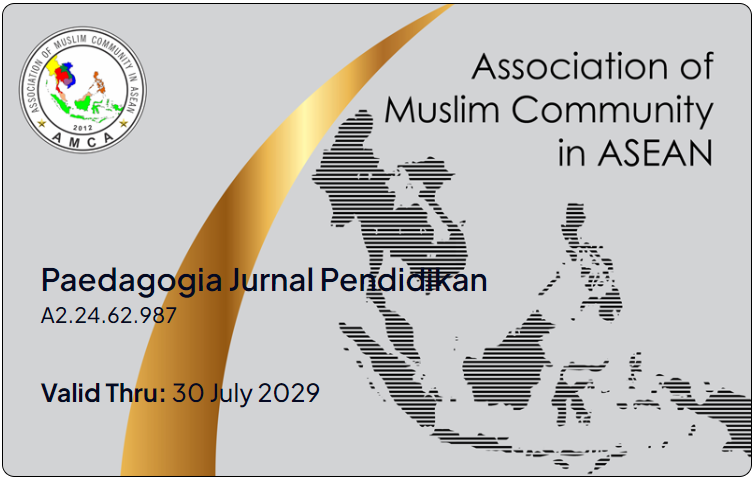ANALYSIS OF FACTORS DETERMINING THE LEVEL OF JOB SATISFACTION OF PRIVATE COLLEGE LECTURERS IN BANJARMASIN
Abstract
ABSTRACT
Job satisfaction is a factor that really needs to be considered in various work organizations, including educational organizations, because job satisfaction has been shown to have many influences on various organizational outputs, especially on work performance. This study aims to determine the level of job satisfaction of private college lecturers and which factors have the greatest role in shaping lecturers’ job satisfaction in Banjarmasin City, South Kalimantan. Respondents in this study were 314 permanent lecturers in various private college that still active in Banjarmasin City. Job satisfaction was measured by 5 indicators, each described by a few items. Data analysed using Spearman’s Correlation to determine the correlation between every indicator to it’s total variable. The results of the study found that the most satisfying factor according to the lecturers was the work environment, while the factor that had the biggest role in shaping job satisfaction was workplace guidance, especially the role of leadership in directing and providing input to lecturers. It is hoped that through this research, lecturers' job satisfaction can be maintained and have a positive impact on various other organizational outputs.
Downloads
References
Anwar, Mahfuzil, Grahita Chandrarin, Junianto Tjahjo Darsono, and Harianto Respati. 2017. "Lecturer Job Performance Study: Motivation, Emotional Intelligence, Organizational Culture and Transformational Leadership as Antecedents with Job Satisfaction as an Intervening." IOSR Journal of Business and Management 01-09.
Armstrong, Michael. 2006. Strategic Human Resources Management A Guide To Action. Philadelphia: Thomson-Shore, Inc.
Aziri, B. 2011. "Job Satisfaction, a Literature Review." Management Research and Practice, 3(1) 77-90.
Barakat, L. L, M. P Lorenz, J. R Ramsey, and S. L Cretoiu. 2015. "Global managers." International Journal of Emerging Markets, 10(4) 781–800.
Chaplain, R. P. 2008. "Stress and psychological distress among trainee secondary teachers in England." Educational Psychology, 28 195–209.
Göker, Suleyman Davut. 2012. "Impact of EFL Teachers‘ Collective Efficacy and Job Stress on Job Satisfaction." Theory and Practice in Language Studies, Vol. 2, No. 8, 1545-1551.
Handoko, T Hani. 1995. Manajemen Personalia dan Sumber Daya Manusia. Yogyakarta: Liberty.
Heathfield, Susan M. 2019. How (and Why) to Foster Employee Satisfaction. 5 12. https://www.thebalancecareers.com/employee-satisfaction-1918014.
Herlina, P, and H.M.C Wahyudi. 2016. "Pengaruh Gaya Kepemimpinan Dan Iklim Organisasi Terhadap Kinerja Dosen Sekolah Tinggi Ilmu Kesehatan." Jurnal Pendidikan dan Pembelajaran Khatulistiwa. 5(11) 1-10.
Jon, G. 2011. "A Study of Job Motivation, Satisfaction, and Performance among Bank Employees." Journal of Global Business Issue, 5(1) 29–42.
Judge, T A, and J. A Kammeyer-Mueller. 2012. "Job attitudes." Annual Review of Psychology 63 341–367.
Luthans, Fred. 2011. Organizational Behavior 12th ed. New York: McGraw Hill.
Noermijati. 2008. "Kajian Terhadap Teori Dua Faktor Herzberg, Pengaruhnya Terhadap Job Satisfaction Dan Kinerja Spiritual Manajer Operasional Pada Perusaan Kecil Rokok Skt Di Kota Dan Kabupaten Malang." National Conference on Management Research.
Purcell, J. 1994. "Personnel earns a place on the board." Personnel Management, February 26–29.
Robbins, Stephen P. 2003. Organizational Behavior. New Jersey: Pearson Education, Inc.
Shahab, M. A, and I Nisa. 2014. "The influence of leadership and work attitudes toward job satisfaction and performance of employee." International Journal of Managerial Studies and Research, 2(5) 69-77.
Subarto, Dede Solihin, and Derita Qurbani. 2021. "Determinants of Job Satisfaction and Its Implications for the Lecturers Performance." JURNAL PENDIDIKAN EKONOMI & BISNIS 163-178.
Zain, R, A.T Ridlo, and D Yuliana. 2017. "Pengaruh Kompensasi dan Kepuasan Kerja terhadap Kinerja Dosen Fakultas Ilmu Tarbiyah dan Keguruan UIN Sunan Kalijaga." Manageria: Jurnal Manajemen Pendidikan Islam. 2(1) 107-126.
Copyright (c) 2022 Paedagogia: Jurnal Pendidikan

This work is licensed under a Creative Commons Attribution-NonCommercial 4.0 International License.
The author agrees to the following conditions upon publishing a work to Paedagogia: Jurnal Pendidikan:
1. Each article is licensed under a Creative Commons Attribution-NonCommercial 4.0 International License. The author(s) recognizes that Paedagogia: Jurnal Pendidikan has the right to be the first to publish under a Creative Commons Attribution-NonCommercial 4.0 International License. This license permits the copying and redistribution of this material in any form or format, as well as the composition, modification, and creation of derivative works of this material for any purpose, but Non commercial, as long as the author is credited with the original work.
2. Authors may submit articles separately or arrange for non-exclusive distribution of manuscripts previously published in this journal in other forms (e.g., to the author's institutional repository, publication in books, etc. ), provided that the manuscript is acknowledged as having been published first in the Paedagogia: Jurnal Pendidikan.
3. A copyright submission agreement must attach each approved manuscript prior to publication. You may obtain the form for the copyright submission agreement here (INA) (EN).

































 This work is licensed under a
This work is licensed under a 